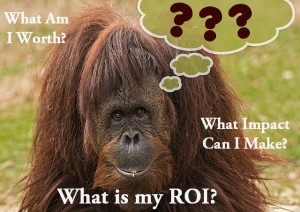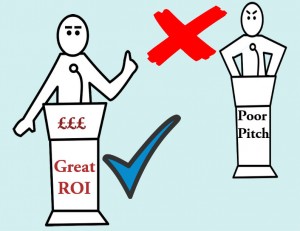Do you understand the concept of your ROI when applied to you as a speaker? Well, you can bet the company booking you does. I recently attended a conference in the USA and interestingly, one of the delegates there, who specialises in marketing speakers, wrote a LinkedIn post I found to be very pertinent. Many speakers want to know how they earn the “big bucks” and Aidan Crawford’s pithy answer is,
You’ll earn $10,000 when you convince someone you’re worth $10,000.
The powerful point that Aidan was making in the article was that a company sees a speaker as a business tool and wants to know the WHY of hiring them. This is not satisfied by vague claims of making a workforce happier or improving how people work together. Try saying “So What?” after each of those ideas. Yippee, a happy workforce, that will please the shareholders.
How about, saying instead- “If you hire me it will improve retention by 25% and reduce sick leave by 30%” – now you are talking a language your prospective client understands. That translates into actual cold hard cash for a business. Now you are showing your ROI- return on investment.
Showing your ROI in your elevator pitch* 
Usually when you meet a busy CEO or HR Director you have a very short time to convince them to hire you. Let’s face it- they will expect you to be able to pitch yourself well as a professional speaker, or why even consider you?
I was able to have a long chat with Aidan and he did indeed ask me what I spoke about. As he describes in the article I launched into my elevator pitch which I had devised with the help of another fellow speaker.
It is so hard, when you know your subject so well and how it affects the people you speak to, to summarise, in no more than 30 seconds, your topic.
I already knew there was something amiss with my elevator pitch. Every time I had delivered it a part of my mind was distracted with the thought of ‘hmm, something doesn’t sound quite right. There’s something missing….’ Although it did contain the main facts of who I am and what a unique experience I had been through, it was still missing a key ingredient.
However, after chatting with Aidan I realised what was wrong. It didn’t explain to a client why hiring me to speak about the lessons I have drawn from my experiences would benefit them or their delegates. As we spoke he made me go over and over my pitch having asked me questions he highlights in his article i.e. What is your ROI to a client?
I’ve since re-written it very much based on his advice and noticed that clients are quicker in deciding to book me and the fee I charge becomes secondary.
Don’t ever think your ROI is not about the money
 When you approach a client about hiring you as a speaker, or if you are a business hiring a speaker, think carefully about what you want from the exchange. Don’t get lost in nice ideas about delegates “enjoying” the speech. Of course they should enjoy it, but is that really the point? Really good sales people understand that we spend money on perceived benefits, not vague promises. If you dine out at a fine restaurant you expect good food, good service and an experience. You are not eating there just because you are hungry. Yes you need to eat, but you want to enjoy it beyond grabbing a burger at the local fast food place.
When you approach a client about hiring you as a speaker, or if you are a business hiring a speaker, think carefully about what you want from the exchange. Don’t get lost in nice ideas about delegates “enjoying” the speech. Of course they should enjoy it, but is that really the point? Really good sales people understand that we spend money on perceived benefits, not vague promises. If you dine out at a fine restaurant you expect good food, good service and an experience. You are not eating there just because you are hungry. Yes you need to eat, but you want to enjoy it beyond grabbing a burger at the local fast food place.
If you want to command a high speakers’ fee then your clients’ needs and wants must be satisfied – you have to give them exceptional value as a return on their investment. To achieve that you need to understand what their measure of value is; what they want to achieve from hiring you. A real return on investment is quantifiable, and can be translated into profit, or at the very least, savings or reductions in cost. Your ROI needs to be clear, understandable and match the clients’ needs. Once you get that established, then your value increases.
Similarly a business needs to be clear about their expectations of a speakers’ impact on their delegates. It may be that your workforce is demotivated and an inspirational speaker will re-motivate them. Measuring the impact of that can be difficult, so establish some kind of benchmark to track the impact. A good speaker will be able to give a company ideas on this and will know their ROI and state it clearly. Understanding and being able to explain your ROI is mutually beneficial for speaker and client.
Now go polish up that elevator pitch!

